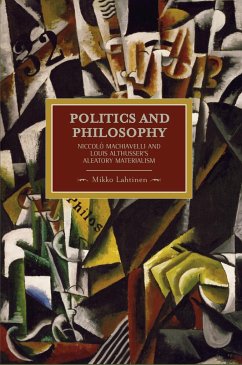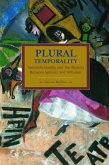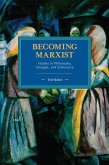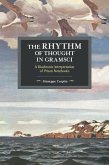Mikko LahtinenNiccolò Machiavelli and Louis Althusser's Aleatory Materialism
Politics and Philosophy
Niccolò Machiavelli and Louis Althusser's Aleatory Materialism
Übersetzer: Griffiths, Gareth; Köhli, Kristina
Mikko LahtinenNiccolò Machiavelli and Louis Althusser's Aleatory Materialism
Politics and Philosophy
Niccolò Machiavelli and Louis Althusser's Aleatory Materialism
Übersetzer: Griffiths, Gareth; Köhli, Kristina
- Broschiertes Buch
- Merkliste
- Auf die Merkliste
- Bewerten Bewerten
- Teilen
- Produkt teilen
- Produkterinnerung
- Produkterinnerung
Often portrayed as an aloof philosopher, Lahtinen argues that his work on Machiavelli reveals Althusser's deep commitment to political practice
Andere Kunden interessierten sich auch für
![Plural Temporality Plural Temporality]() Vittorio MorfinoPlural Temporality32,99 €
Vittorio MorfinoPlural Temporality32,99 €![Philosophy After Marx Philosophy After Marx]() Christoph HenningPhilosophy After Marx62,99 €
Christoph HenningPhilosophy After Marx62,99 €![A Failed Parricide A Failed Parricide]() Roberto FinelliA Failed Parricide31,99 €
Roberto FinelliA Failed Parricide31,99 €![Becoming Marxist Becoming Marxist]() Ted StolzeBecoming Marxist38,99 €
Ted StolzeBecoming Marxist38,99 €![The Rhythm of Thought in Gramsci The Rhythm of Thought in Gramsci]() Giuseppe CospitoThe Rhythm of Thought in Gramsci32,99 €
Giuseppe CospitoThe Rhythm of Thought in Gramsci32,99 €![Potentia of Poverty Potentia of Poverty]() Margherita PascucciPotentia of Poverty27,99 €
Margherita PascucciPotentia of Poverty27,99 €![Dialectics of the Ideal Dialectics of the Ideal]() Dialectics of the Ideal32,99 €
Dialectics of the Ideal32,99 €-
-
-
Often portrayed as an aloof philosopher, Lahtinen argues that his work on Machiavelli reveals Althusser's deep commitment to political practice
Hinweis: Dieser Artikel kann nur an eine deutsche Lieferadresse ausgeliefert werden.
Hinweis: Dieser Artikel kann nur an eine deutsche Lieferadresse ausgeliefert werden.
Produktdetails
- Produktdetails
- Verlag: Haymarket Books
- Seitenzahl: 351
- Erscheinungstermin: 14. Juni 2011
- Englisch
- Abmessung: 226mm x 147mm x 25mm
- Gewicht: 576g
- ISBN-13: 9781608461233
- ISBN-10: 1608461238
- Artikelnr.: 32421736
- Herstellerkennzeichnung
- Libri GmbH
- Europaallee 1
- 36244 Bad Hersfeld
- gpsr@libri.de
- Verlag: Haymarket Books
- Seitenzahl: 351
- Erscheinungstermin: 14. Juni 2011
- Englisch
- Abmessung: 226mm x 147mm x 25mm
- Gewicht: 576g
- ISBN-13: 9781608461233
- ISBN-10: 1608461238
- Artikelnr.: 32421736
- Herstellerkennzeichnung
- Libri GmbH
- Europaallee 1
- 36244 Bad Hersfeld
- gpsr@libri.de
Mikko Lahtinen: Mikko Lahtinen, Soc.Sc.D. (1997) in Political Science, University of Tampere (Finland), Ph.D. (2006) in History of Ideas, University of Oulu (Finland), is senior lecturer of Political Science at University of Tampere. He has published widely on the political theory, history of political philosophy from Antiquity to contemporary thought, Niccolò Machiavelli and Renaissance thought, Montesquieu and Enlightenment, and the Marxist theory from Marx to Gramsci and Althusser. His theoretical-methodological work focuses on the development of the 'conjunctural' theory of history and politics. His forthcoming book "The Land of Libries" (in Finnish) concerns public library as a strong democratic element in Finnish society.
Foreword
Author's Preface to the English Edition
Chapter 1 Introductory Comments
1.1 Althusser, Machiavelli and political theory
1.2 Althusser's contribution to Machiavelli scholarship
1.3 The approach of the present study
Chapter 2 A Critique of Hegelianism
2.1 A critique of Hegelian dialectics
2.2 Althusser's Marxism
2.3. Althusser's self-criticism
2.4. The 'Machiavellian' Lenin
Chapter 3 Aleatory Materialism
3.1. Prologue: Machiavelli's solitude
3.2. The underground current of the materialism of the encounter
Chapter 4 Althusser's Aleatory Machiavelli
4.1. A preliminary schema: the two dimensions of Machiavelli's differentia
specifica
4.2. Machiavelli's differentia specifica in the history of political
thought
4.3. The praxis of The Prince: the text as a political act
4.4. The praxis of the prince: the aleatory truth
4.5. The praxis of the prince: the project and strategy of the new prince
4.6. Epilogue: Althusser's interpretation of Machiavelli
Chapter 5 The Subversive Machiavelli
5.1. The art of war and the art of politics
5.2. The destructive current of fortuna
5.3. The aspects of fortuna
5.4. Lady fortuna and the young men
5.5. The rise and fall of Cesare Borgia
5.6. 'A stable people'
5.7. Epilogue: Machiavelli and the taming of chance
Chapter 6 Conclusion
References
Index
Author's Preface to the English Edition
Chapter 1 Introductory Comments
1.1 Althusser, Machiavelli and political theory
1.2 Althusser's contribution to Machiavelli scholarship
1.3 The approach of the present study
Chapter 2 A Critique of Hegelianism
2.1 A critique of Hegelian dialectics
2.2 Althusser's Marxism
2.3. Althusser's self-criticism
2.4. The 'Machiavellian' Lenin
Chapter 3 Aleatory Materialism
3.1. Prologue: Machiavelli's solitude
3.2. The underground current of the materialism of the encounter
Chapter 4 Althusser's Aleatory Machiavelli
4.1. A preliminary schema: the two dimensions of Machiavelli's differentia
specifica
4.2. Machiavelli's differentia specifica in the history of political
thought
4.3. The praxis of The Prince: the text as a political act
4.4. The praxis of the prince: the aleatory truth
4.5. The praxis of the prince: the project and strategy of the new prince
4.6. Epilogue: Althusser's interpretation of Machiavelli
Chapter 5 The Subversive Machiavelli
5.1. The art of war and the art of politics
5.2. The destructive current of fortuna
5.3. The aspects of fortuna
5.4. Lady fortuna and the young men
5.5. The rise and fall of Cesare Borgia
5.6. 'A stable people'
5.7. Epilogue: Machiavelli and the taming of chance
Chapter 6 Conclusion
References
Index
Foreword
Author's Preface to the English Edition
Chapter 1 Introductory Comments
1.1 Althusser, Machiavelli and political theory
1.2 Althusser's contribution to Machiavelli scholarship
1.3 The approach of the present study
Chapter 2 A Critique of Hegelianism
2.1 A critique of Hegelian dialectics
2.2 Althusser's Marxism
2.3. Althusser's self-criticism
2.4. The 'Machiavellian' Lenin
Chapter 3 Aleatory Materialism
3.1. Prologue: Machiavelli's solitude
3.2. The underground current of the materialism of the encounter
Chapter 4 Althusser's Aleatory Machiavelli
4.1. A preliminary schema: the two dimensions of Machiavelli's differentia
specifica
4.2. Machiavelli's differentia specifica in the history of political
thought
4.3. The praxis of The Prince: the text as a political act
4.4. The praxis of the prince: the aleatory truth
4.5. The praxis of the prince: the project and strategy of the new prince
4.6. Epilogue: Althusser's interpretation of Machiavelli
Chapter 5 The Subversive Machiavelli
5.1. The art of war and the art of politics
5.2. The destructive current of fortuna
5.3. The aspects of fortuna
5.4. Lady fortuna and the young men
5.5. The rise and fall of Cesare Borgia
5.6. 'A stable people'
5.7. Epilogue: Machiavelli and the taming of chance
Chapter 6 Conclusion
References
Index
Author's Preface to the English Edition
Chapter 1 Introductory Comments
1.1 Althusser, Machiavelli and political theory
1.2 Althusser's contribution to Machiavelli scholarship
1.3 The approach of the present study
Chapter 2 A Critique of Hegelianism
2.1 A critique of Hegelian dialectics
2.2 Althusser's Marxism
2.3. Althusser's self-criticism
2.4. The 'Machiavellian' Lenin
Chapter 3 Aleatory Materialism
3.1. Prologue: Machiavelli's solitude
3.2. The underground current of the materialism of the encounter
Chapter 4 Althusser's Aleatory Machiavelli
4.1. A preliminary schema: the two dimensions of Machiavelli's differentia
specifica
4.2. Machiavelli's differentia specifica in the history of political
thought
4.3. The praxis of The Prince: the text as a political act
4.4. The praxis of the prince: the aleatory truth
4.5. The praxis of the prince: the project and strategy of the new prince
4.6. Epilogue: Althusser's interpretation of Machiavelli
Chapter 5 The Subversive Machiavelli
5.1. The art of war and the art of politics
5.2. The destructive current of fortuna
5.3. The aspects of fortuna
5.4. Lady fortuna and the young men
5.5. The rise and fall of Cesare Borgia
5.6. 'A stable people'
5.7. Epilogue: Machiavelli and the taming of chance
Chapter 6 Conclusion
References
Index








